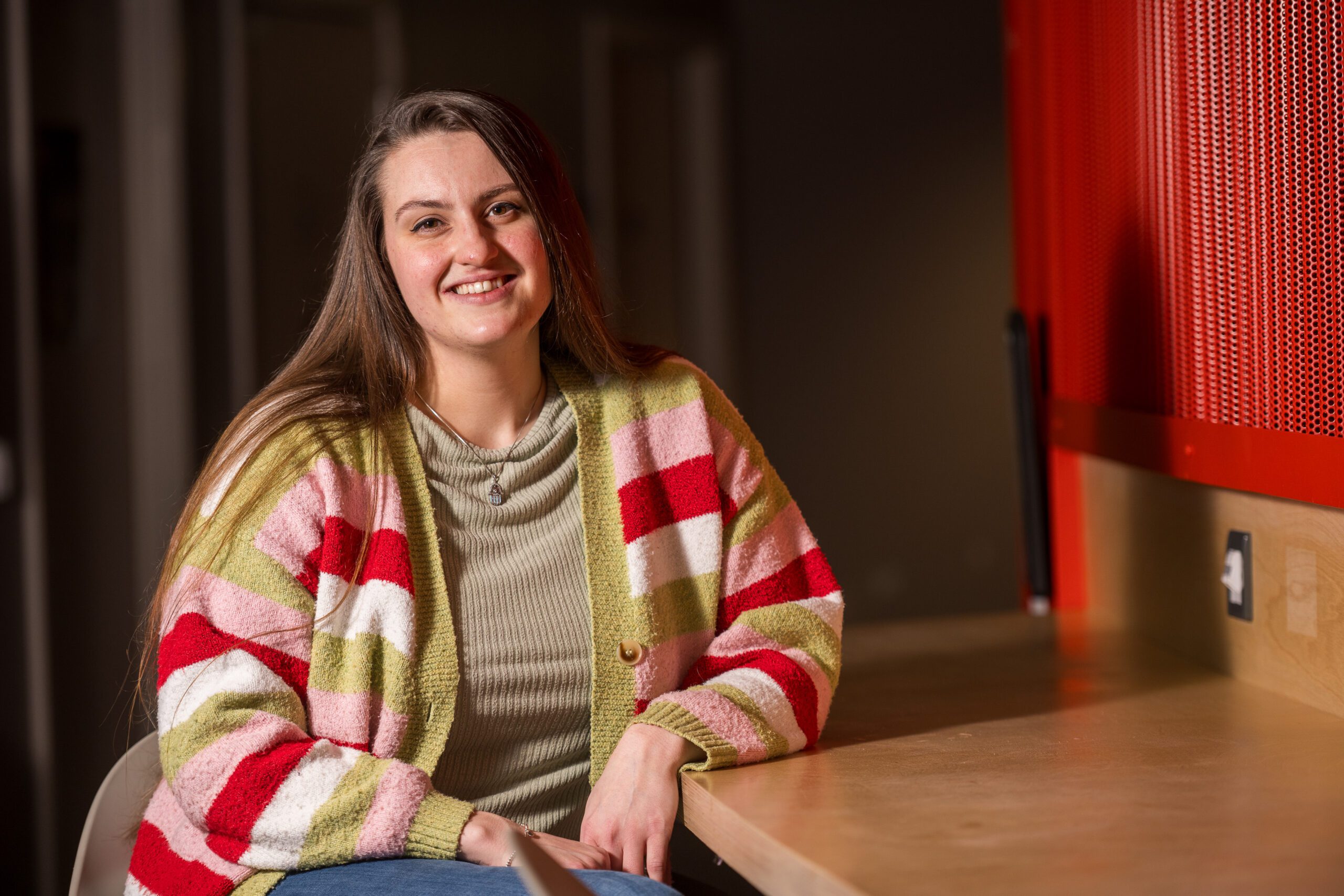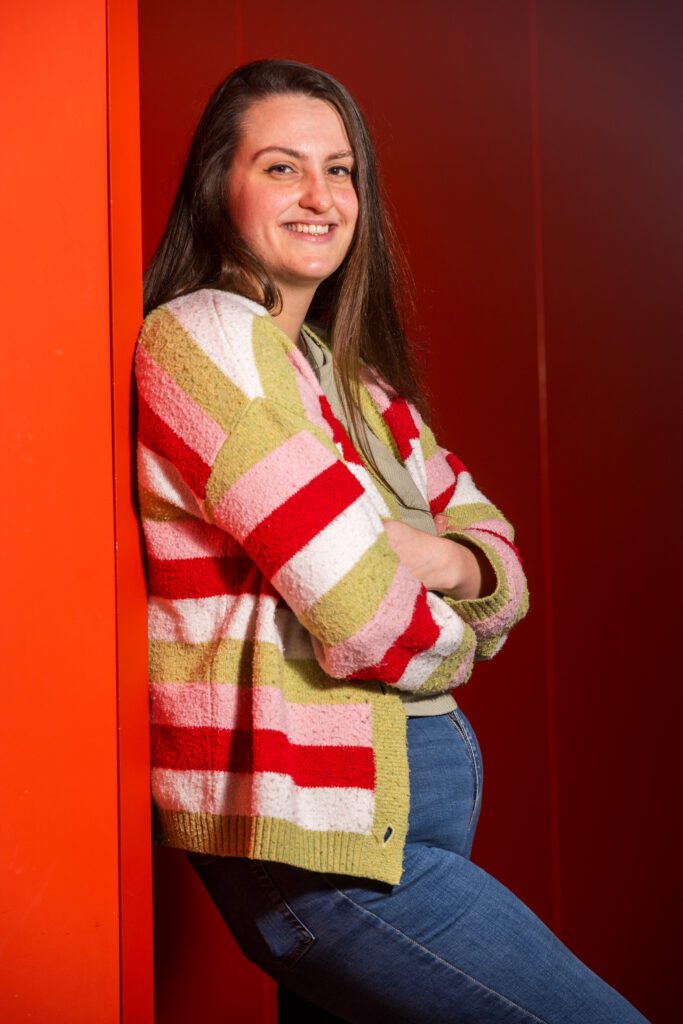
For most of my life, I thought survival was the same as living.
When you grow up constantly adapting, moving between homes, navigating loss, and figuring things out on your own, you don’t really have time to think about your future. You focus on the next step, the next place to stay, the next way to get through.
Now I’m an adult, I’ve learned that life isn’t just about surviving. It’s about finding where you belong.
I’ve learned that life isn’t just about surviving. It’s about finding where you belong.
beginnings
My childhood had a tricky start. My dad passed away from a rare brain disease when I was nine. My mum has significant mental health problems and other issues and struggled to cope.
I moved around constantly, missing large chunks of my education, never really settling anywhere, or feeling like I belonged. It wasn’t until later that I realised how much that instability had shaped me.
By the time I was 13, I was regularly experiencing periods of homelessness, sometimes sleeping in parks or sofa surfing anywhere I could.
School felt like another world, one I wasn’t really part of, although luckily, I did stay in secondary school all the way through to year 11. No one at school really knew what I was going through, and I often got in trouble.
finding stability
When I was 16, I moved in with a family friend, finally providing a little stability.
However, during this time I had to make the heartbreaking decision to put my younger sister into care. I promised her I would find a place for us to live and I would come and get her when I could.
A few months later, I also entered the care system as my options had run out and I had nowhere else to go.
a teenager in foster care
Although, at the time this felt like just another place I had to fit myself into, another environment that wasn’t truly mine, my foster carers did provide some consistency for me.
They encouraged me to investigate the different options that were available for me and supported me to apply for college. They transported me to the campus every day, made sure I had lunch and was prepared for the day, relieving me of some of those responsibilities.
Having this support to further my education helped me to build a sense of my identity and find some self-confidence.
my own home
I had no idea who I was or what I wanted because I’d never had the space to figure it out. Just before I turned 18, I finally got my own supported flat and settled in with help from my social worker and foster carers.
It was the first time I had something that felt truly mine, a space where I could breathe, a place I could invite my friends and my sister to visit. In that tiny flat, I realised that no one else was going to shape my life for me—I had to do it myself.
The problem was, I still didn’t know who I was.
I had spent so much time just trying to get through that I had never figured out what I liked, what I was passionate about, what kind of future I wanted.
university
I ended up going to university, mostly because a social worker and my best friend believed in me, and also because it meant stability—somewhere to live, a financial safety net, a structured next step; a choice I had made for myself.
I got it completely wrong the first time though, choosing a course in Egyptology, moving far away, and feeling more lost than ever. But that’s the thing about life, it teaches you through experience.
That failure wasn’t the end, it turned out to be a lesson.
I needed familiarity, not escape. I realised that it wasn’t the location that felt like home, it was the people
starting again
I learned that being far from my sister and my friends wasn’t best for me; I needed familiarity, not escape.
I realised that it wasn’t the location that felt like home, it was the people. So, I came back to south Wales, enrolled at Cardiff University, and found a subject that I really enjoyed – media.
I tried my hardest, took every opportunity I could including the work experience opportunities offered by the university to care experienced young people.
I learned how to manage my own home, how to trust people again, how to allow myself to dream about something bigger than just the next step.
I ended up falling pregnant with my daughter shortly after my first year and was supported in the transition to student-parenthood by the student support staff at the university, along with my social worker, which meant I could graduate the same time as everyone else.

what support is available for care experienced students?
I now work in the Widening Participation Team in the university that I attended, running the Confident Futures project for care experienced young people like me. We also offer support to young carers, estranged and adopted young people, mirroring the Together at Cardiff model.
I realised that were it not for the support from my social worker and other adults throughout my young adult life, I would not have found my way to university or had access to any of the opportunities I did.
Research suggests that some who work with young people are not aware of what is available. To tackle this, Cardiff University now runs free online training for professionals on supporting these young people into Higher Education.
I feel like I finally have the confidence to advocate for myself and for others. I am so privileged to be able to pass on the knowledge I have gained, in the hope that it can help others to find support they are entitled to and wholly deserve.
my home
Now, in my late 20s, I have gradually and slowly built something that feels like home, something I chose. My daughter is wonderful, I learned to drive and grew a wonderful support network of friends, colleagues and supporters.
My sister is thriving at university, completing her own undergraduate degree and working towards her own future. She remained in contact with her foster family for a long while, and they, in turn accepted me and supported our relationship to grow. I was not able to see my sister often while I was in university, but it was a massive weight off my shoulders to know that someone was there for her while I could not be.
Finally, the best change of all: last year, for the first time in over a decade, my sister and I live together again. Our own family dynamic, which with my daughter, finally feels like home.
celebrating care experience
We now celebrate our experience of being in care and are both actively involved in groups such as Voices From Care Cymru, CLASS CYMRU and CASCADE, and have been lucky enough to attend the Cardiff Christmas Dinner for the past two years.
We have found where we fit.
For so long, I thought belonging was about a place but it’s not. It’s about the people, and it’s about you. It’s about finding those who see you, who lift you up, who remind you that you are so much more than just your past.
Every step in my journey would not have been possible without the right people connecting, talking, supporting and believing in me; something that every child in care deserves.
every step in my journey would not have been possible without the right people connecting, talking, supporting and believing in me

If you’d like to get in touch with Cardiff University about any of the services mentioned above, or to be added to their mailing list, or to find out more about our outreach programmes, please email [email protected].
